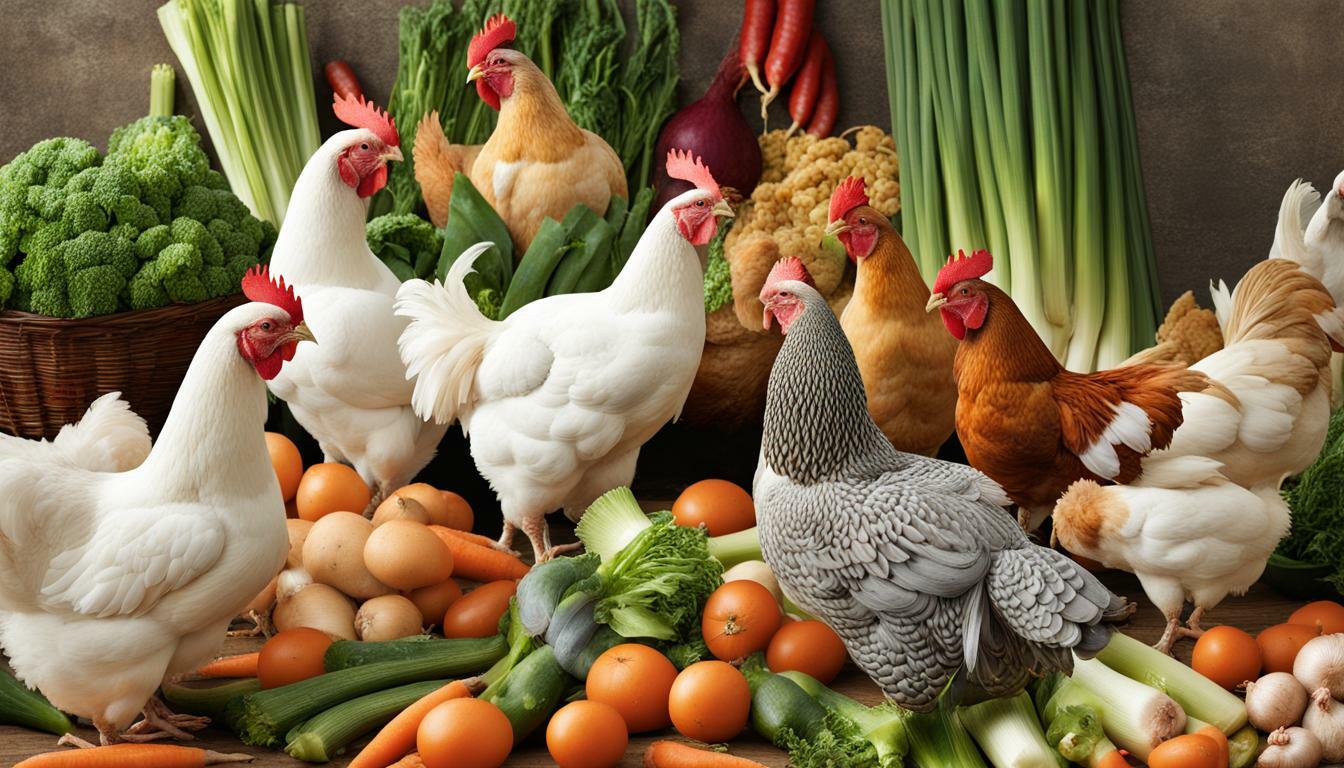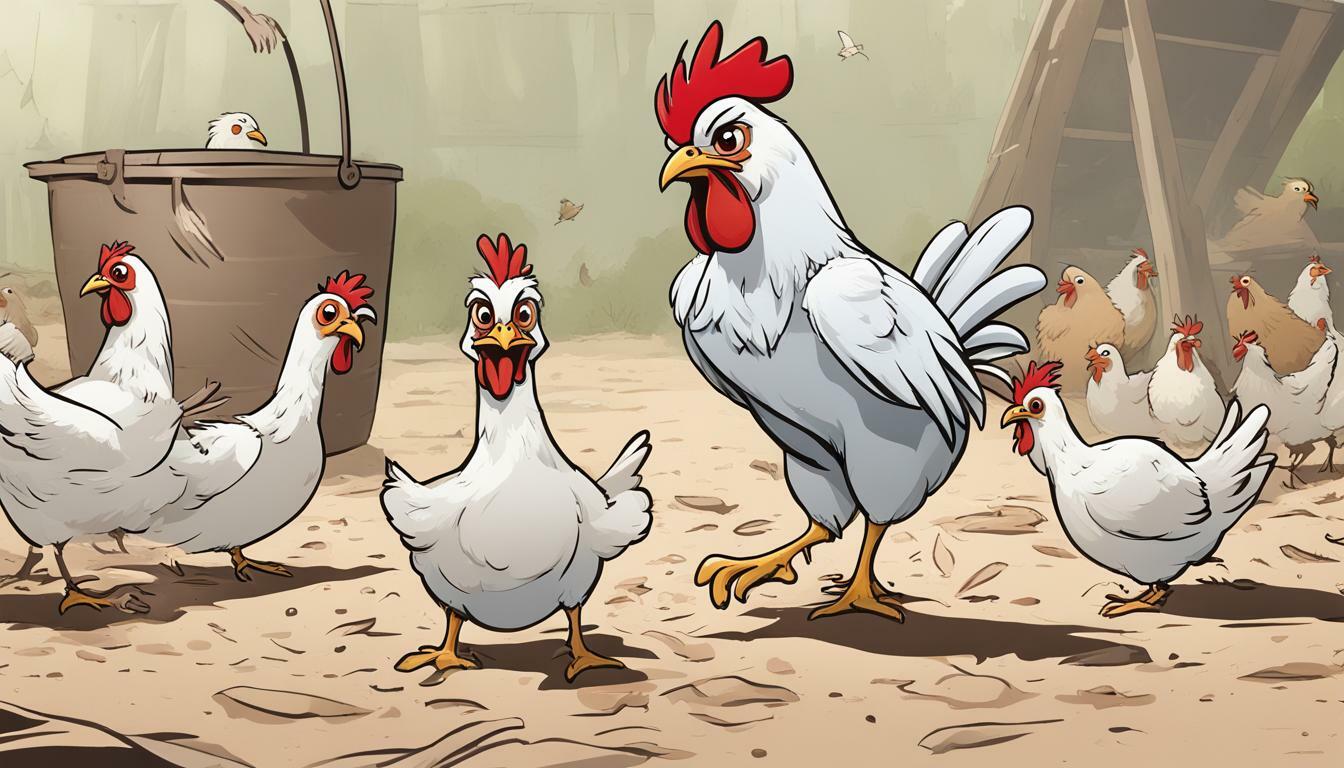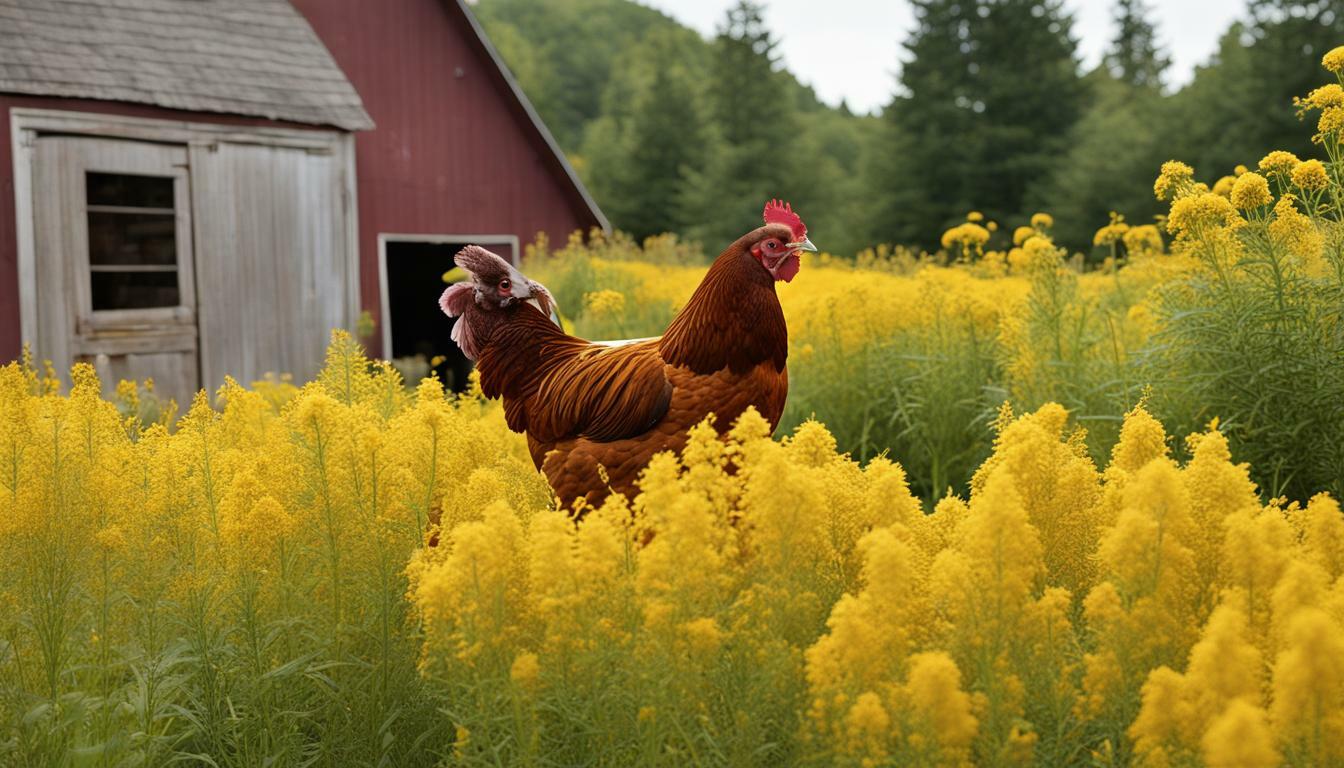Can Chickens Eat Pumpkins? Nutrition and Health Facts
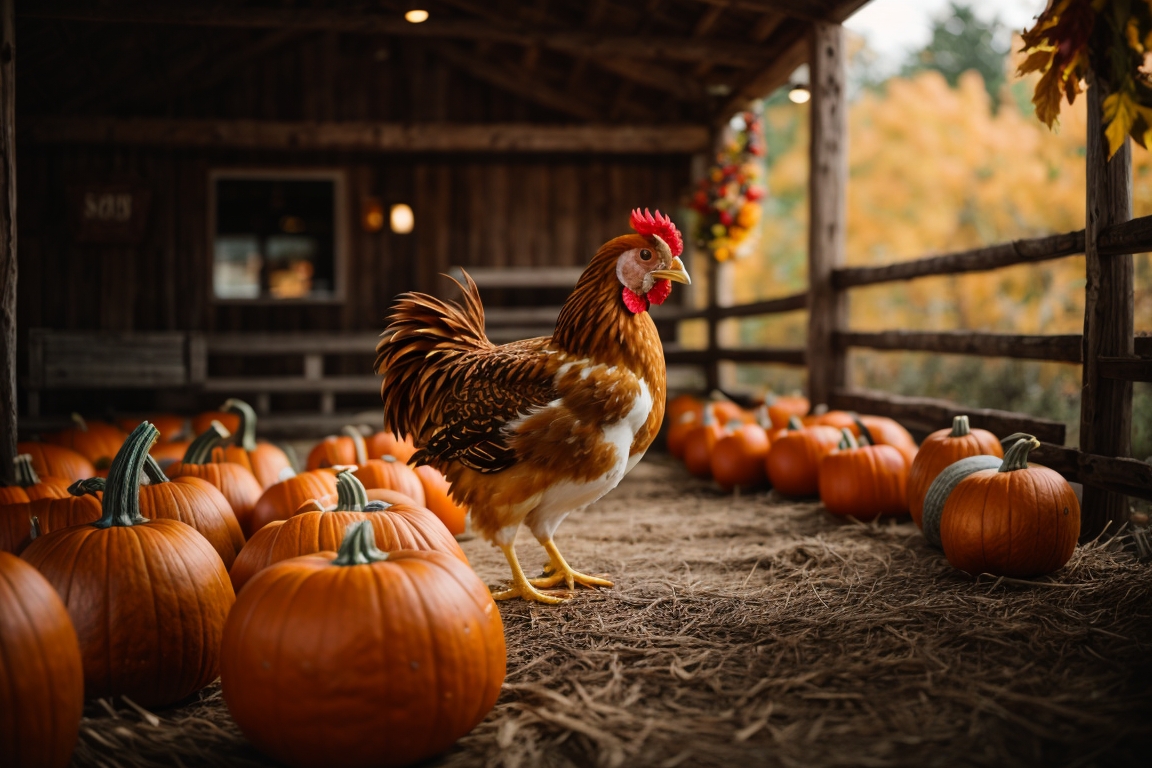
Table of content:
- Why Can Chickens Eat Pumpkin?
- What Parts of a Pumpkin Can Chickens Eat?
- How Much Pumpkin Can Chickens Eat?
- How to Feed Pumpkin to Chickens
- Health Benefits of Pumpkins for Chickens
- Are Pumpkins Safe for Baby Chicks?
- Can Chickens Eat Rotten Pumpkins?
- Can Chickens Eat Pumpkin Skin?
- Can Chickens Eat Too Much Pumpkin?
- Are Pumpkin Seeds Safe for Chickens?
- Frequently Asked Questions
- Conclusion
Pumpkins are a popular fall treat for humans, but can chickens eat pumpkins? too? The short answer is yes, chickens can safely eat pumpkins in moderation as part of a balanced diet. Keep reading to learn more about feeding chickens pumpkins, including which parts to feed them, the health benefits, and how much pumpkin chickens can eat.
Key Takeaways:
- Chickens can eat most parts of a pumpkin, including the flesh, seeds, and even the guts. Avoid moldy or rotten pumpkins.
- Pumpkins offer many nutrients like vitamin A, beta-carotene, potassium, and fiber. They benefit chicken health and egg quality.
- Feed chickens pumpkin flesh raw or cooked, seeds, and guts in moderation as an occasional treat.
- Too much pumpkin can cause loose droppings. Limit treats to 10% of daily feed.
Why Can Chickens Eat Pumpkin?
Chickens are omnivores, meaning they can eat both plant and animal materials. As autumn rolls around, chickens can enjoy pecking at fresh pumpkins right along with us. The beta-carotene that gives pumpkins their bright orange color is an antioxidant that boosts chicken immunity. Pumpkins also provide nutrients like:
- Vitamin A for healthy eyesight
- Potassium for egg production
- Fiber for digestion
- Calcium and phosphorus for strong bones and eggshells
So while pumpkins make a tasty treat, they also pack a nutritious punch for chickens.
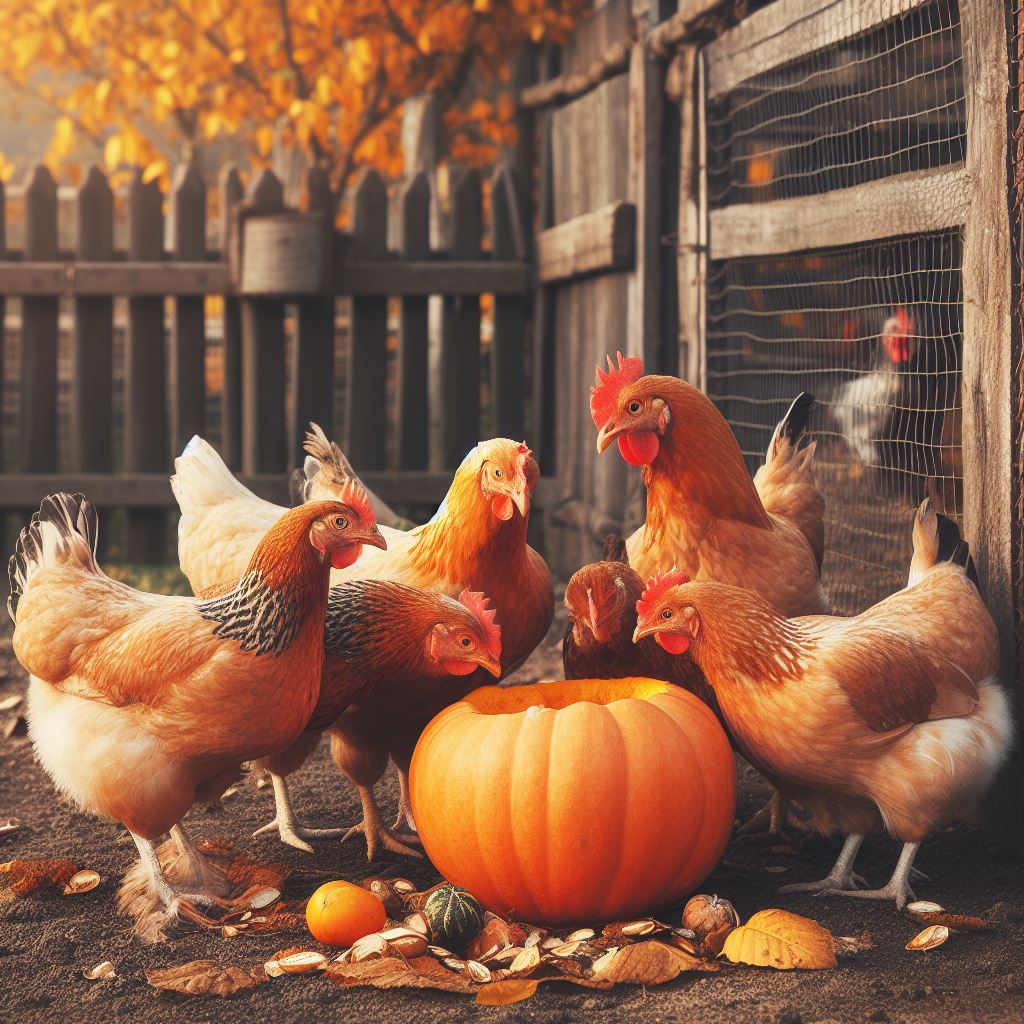 What Parts of a Pumpkin Can Chickens Eat?
What Parts of a Pumpkin Can Chickens Eat?
Chickens can eat all parts of a pumpkin, including:
- Flesh – The meat of the pumpkin is safe for chickens to eat raw or cooked. It provides fiber, beta-carotene, vitamins, and minerals.
- Seeds – Pumpkin seeds provide protein, minerals, and omega-3 fatty acids. Chickens will enjoy foraging for them.
- Guts – The stringy pulp, seeds, and membranes are all edible for chickens. The guts provide fiber.
- Skin – The outer rind is also chicken-safe, though some chooks may not find it as palatable.
Avoid feeding chickens moldy, rotting, or spoiled pumpkins with bacteria or fungi. Also do not feed chickens raw pumpkin seeds from carving pumpkins, as these are often treated or dyed.
| Pumpkin Part | Nutrients | Benefits |
|---|---|---|
| Flesh | Beta-carotene, vitamin A, potassium, fiber | Immunity, eyesight, eggshells, digestion |
| Seeds | Protein, omega-3s, minerals | Overall health |
| Guts | Fiber | Digestive health |
| Skin | Fiber, small amounts of vitamins | Low in nutrients |
How Much Pumpkin Can Chickens Eat?
Pumpkin flesh, seeds, and other parts can make up around 10% of a chicken’s daily diet. Feed pumpkin as an occasional treat a few times per week rather than every day.
Too much pumpkin can lead to loose droppings, diarrhea, or upset digestion. Limit a chicken’s daily treats like pumpkin to:
- 10% of daily feed for adult chickens
- 5% of daily feed for chicks under 6 months old
Also, feed pumpkin in reasonable amounts that your chickens will finish within a day. Uneaten, rotting pumpkins can breed bacteria.
For free-range chickens, allow them to naturally forage and peck at pumpkins in their run. Simply offer a few whole, uncarved pumpkins and let the chickens nibble as they desire.
How to Feed Pumpkin to Chickens
Here are some ways to serve chicken pumpkin:
- Chopped raw pumpkin flesh
- Cooked pumpkin mash, baked pumpkin, or pumpkin pie filling without spices
- Raw pumpkin guts and seeds from carving (don’t allow to rot)
- Dried pumpkin seeds (unseasoned)
- Sprinkle seeds and flesh into their feed
- Toss pumpkin pieces into leaf litter for foraging
Many owners find chickens eagerly gobbling up pumpkin treats. The high fiber content takes them time to digest, keeping them happily occupied.
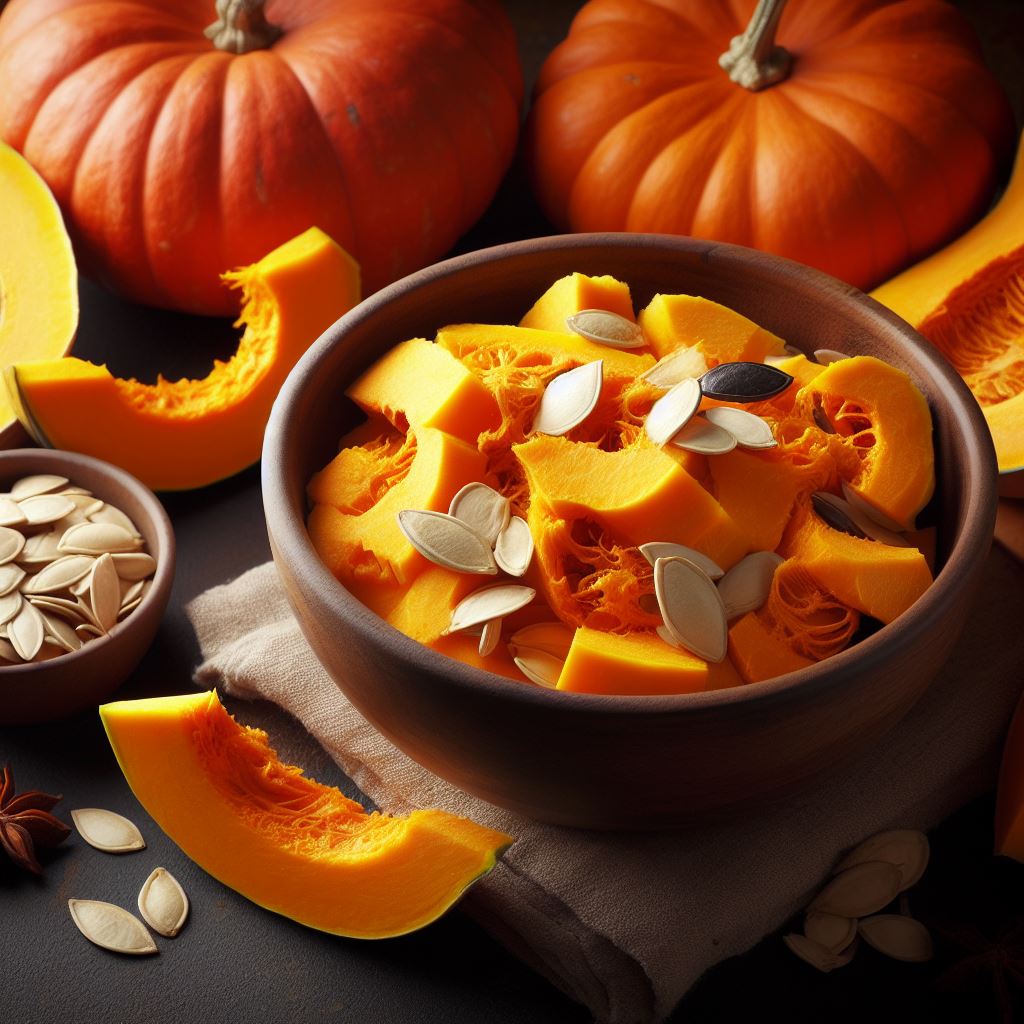 Health Benefits of Pumpkins for Chickens
Health Benefits of Pumpkins for Chickens
Eating pumpkins in moderation offers chickens many health benefits:
- Vitamin A for Eyesight – Pumpkins are packed with vitamin A and beta-carotene, both crucial for chicken vision. The bright orange pigments support good eyesight and prevent eye issues.
- Immune-Boosting Antioxidants – Pumpkins contain the antioxidants beta-carotene and vitamin C to boost chicken immunity against disease.
- Reproductive Health – The vitamin E in pumpkin promotes embryo development and fertility in breeding hens.
- Digestive Health – Pumpkin provides a good dose of fiber to support digestion and prevent issues like crop impactions. The fiber also promotes good gut bacteria.
- Bone Health – Pumpkins contain calcium for forming strong bones, and phosphorus to harden bones. Both minerals also contribute to eggshell strength.
So while pumpkins make for a yummy autumn snack, they also give chickens key nutrients for staying healthy. Feed pumpkins as a supplement to a complete feed for optimal nutrition.
Are Pumpkins Safe for Baby Chicks?
Yes, even baby chicks can eat pumpkin in moderation. However, limit treats to around 5% of total feed for chicks under 6 months old. Their digestive systems are more delicate.
Chop or mash pumpkin flesh into tiny pieces for chicks. Also, monitor to ensure the pumpkin does not cause loose droppings. If so, stop feeding until chicks are older.
Can Chickens Eat Rotten Pumpkins?
No, chickens should not eat moldy, rotting, or fermented pumpkins. As pumpkins decompose, they can grow dangerous molds that produce mycotoxins. Consuming moldy pumpkins can make chickens very sick.
Signs of rotten pumpkin include:
- Visible mold or fungi
- Soft, watery textures
- Foul odors
- Discoloration
Rotting pumpkin can also grow Salmonella, E. coli, and other bacteria that cause gastrointestinal illness in chickens.
Only feed fresh, firm pumpkins free of decay. Properly compost or discard old jack-o-lanterns and pumpkins.
Can Chickens Eat Pumpkin Skin?
Chickens can eat pumpkin skin, though some may not like the tough, bland rind. The skin is not harmful but provides minimal nutrients compared to the flesh.
Many chickens enjoy pecking at whole, uncarved pumpkins. They will naturally eat the flesh and seeds while ignoring the harder rind.
Some owners boil or bake pumpkins whole, which softens the skin. But chickens do not derive much benefit from the skin alone compared to the bright inner flesh.
Can Chickens Eat Too Much Pumpkin?
Yes, chickens can experience issues if they eat excessive amounts of pumpkin. Consuming too much can lead to:
- Nutritional imbalances if pumpkin displaces their complete feed
- Loose droppings or diarrhea
- Dehydration
- Weight gain
- Intestinal impaction or crop impaction
Limit treats like pumpkin to around 10% of the total daily diet. Also, restrict high fiber treats if chickens already have loose droppings or diarrhea.
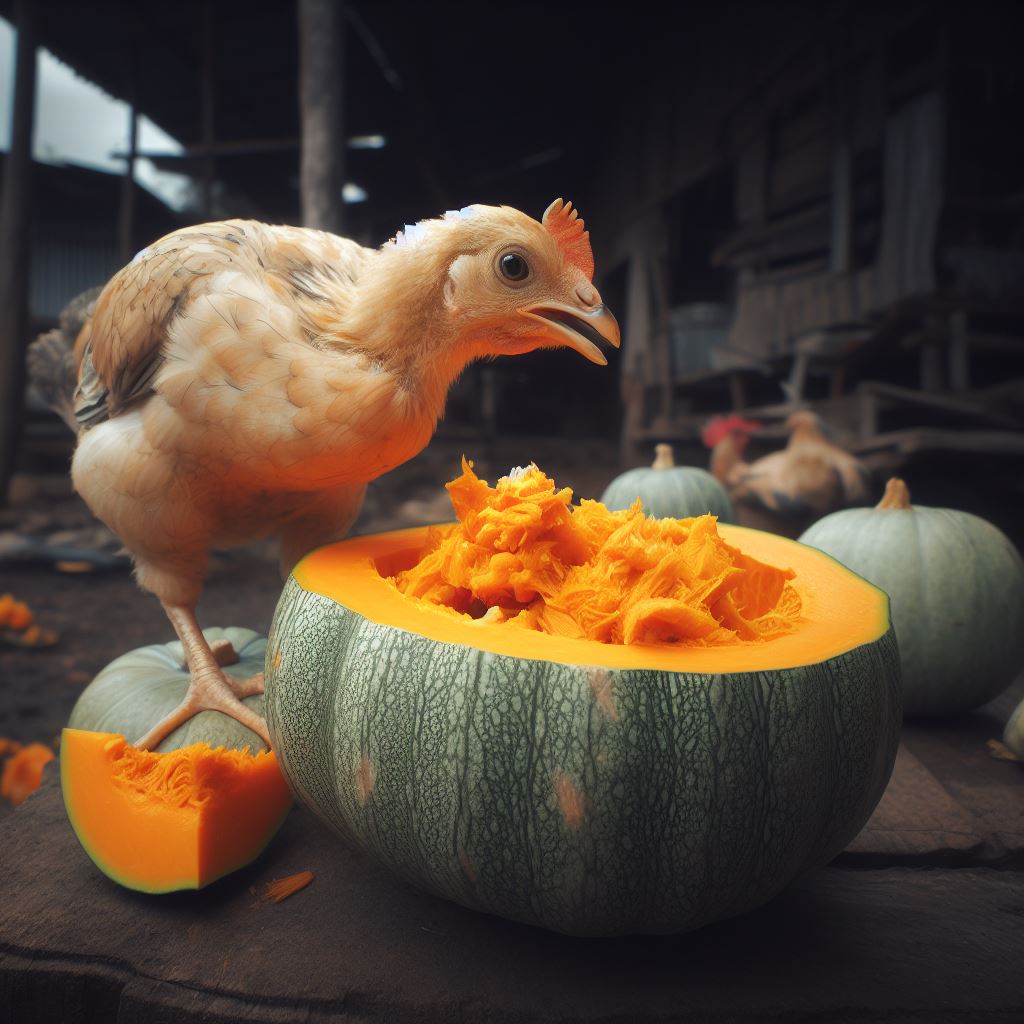 Are Pumpkin Seeds Safe for Chickens?
Are Pumpkin Seeds Safe for Chickens?
Chickens can safely eat unseasoned, raw pumpkin seeds. The seeds provide protein, omega-3 fatty acids, zinc, iron, magnesium, and phosphorus.
However, do not feed chicken seeds extracted from a carved Halloween pumpkin, as these are often sprayed or dyed. Stick to raw pumpkin seeds bought specifically for eating.
Chickens will happily forage and peck for seeds when offered a whole pumpkin. Limit portions to avoid excess fat.
Frequently Asked Questions
Can chickens eat pumpkin guts?
Yes. Chickens can eat all the stringy pulp, seeds, and membranes from the inside of a pumpkin. These “guts” provide fiber, protein from the seeds, and small amounts of vitamins.
Is pumpkin good for chicken eggs?
Yes. The beta-carotene, vitamin A, and calcium in pumpkin are especially good for egg-laying hens. The nutrients contribute to strong eggshells and vibrant egg yolks.
Do chickens like pumpkin pie?
Plain pumpkin pie filling without sugar or spices is safe for chickens. Avoid pie with cinnamon, nutmeg, brown sugar, or other ingredients. Stick to plain cooked pumpkin mash.
Can chickens eat pumpkin raw?
Absolutely. Many chickens enjoy pecking at raw pumpkin flesh. The raw form provides more active enzymes and vitamins than cooked. Both are nutritious in moderation.
Can too much pumpkin kill chickens?
No, but eating rotten or moldy pumpkins can make chickens very ill and possibly result in death. Fresh pumpkin fed in reasonable amounts is safe. Monitor for signs of tummy troubles.
Conclusion
Pumpkins make a crunchy, tasty autumn treat that most chickens relish. In moderation, pumpkins provide healthy antioxidants, vitamins, and minerals. Feed chickens flesh, seeds, and guts, avoiding any decayed or rotten pumpkin.
Limit pumpkin to around 10% of daily feed as too much can cause digestive upset. With sensible portions, chickens can safely enjoy this seasonal delight.
Welcome. I’m Adreena Shanum, the proud owner of this website, and I am incredibly passionate about animals, especially poultry. I founded adreenapets.com as a labor of love, stemming from my desire to share my knowledge and experiences with poultry enthusiasts worldwide.


